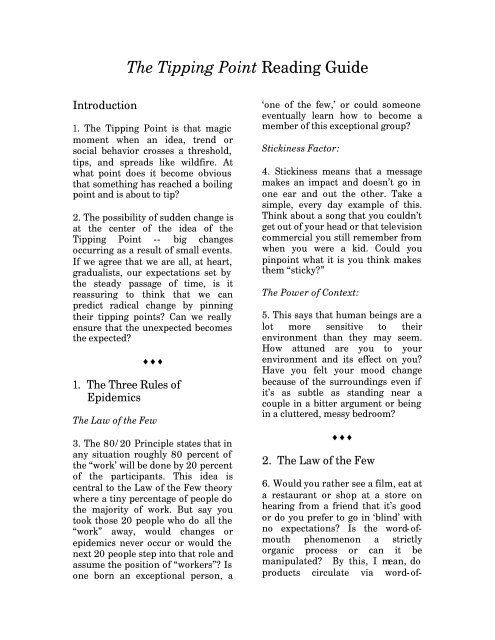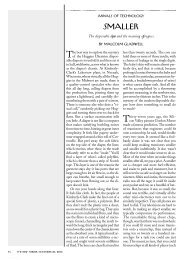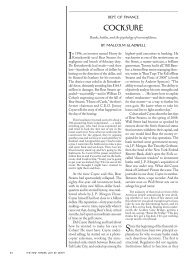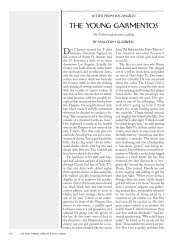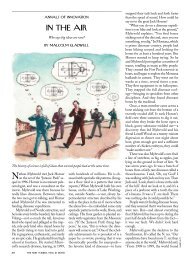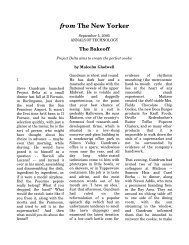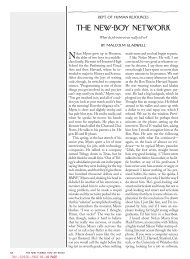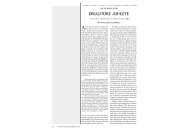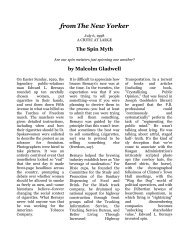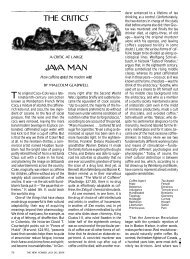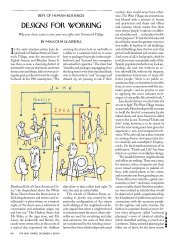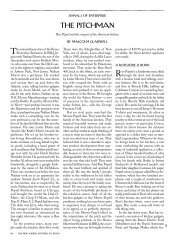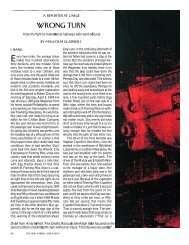The Tipping Point Reading Guide
The Tipping Point Reading Guide
The Tipping Point Reading Guide
Create successful ePaper yourself
Turn your PDF publications into a flip-book with our unique Google optimized e-Paper software.
Introduction<br />
<strong>The</strong> <strong>Tipping</strong> <strong>Point</strong> <strong>Reading</strong> <strong>Guide</strong><br />
1. <strong>The</strong> <strong>Tipping</strong> <strong>Point</strong> is that magic<br />
moment when an idea, trend or<br />
social behavior crosses a threshold,<br />
tips, and spreads like wildfire. At<br />
what point does it become obvious<br />
that something has reached a boiling<br />
point and is about to tip?<br />
2. <strong>The</strong> possibility of sudden change is<br />
at the center of the idea of the<br />
<strong>Tipping</strong> <strong>Point</strong> -- big changes<br />
occurring as a result of small events.<br />
If we agree that we are all, at heart,<br />
gradualists, our expectations set by<br />
the steady passage of time, is it<br />
reassuring to think that we can<br />
predict radical change by pinning<br />
their tipping points? Can we really<br />
ensure that the unexpected becomes<br />
the expected?<br />
♦♦♦<br />
1. <strong>The</strong> Three Rules of<br />
Epidemics<br />
<strong>The</strong> Law of the Few<br />
3. <strong>The</strong> 80/20 Principle states that in<br />
any situation roughly 80 percent of<br />
the “work’ will be done by 20 percent<br />
of the participants. This idea is<br />
central to the Law of the Few theory<br />
where a tiny percentage of people do<br />
the majority of work. But say you<br />
took those 20 people who do all the<br />
“work” away, would changes or<br />
epidemics never occur or would the<br />
next 20 people step into that role and<br />
assume the position of “workers”? Is<br />
one born an exceptional person, a<br />
‘one of the few,’ or could someone<br />
eventually learn how to become a<br />
member of this exceptional group?<br />
Stickiness Factor:<br />
4. Stickiness means that a message<br />
makes an impact and doesn’t go in<br />
one ear and out the other. Take a<br />
simple, every day example of this.<br />
Think about a song that you couldn’t<br />
get out of your head or that television<br />
commercial you still remember from<br />
when you were a kid. Could you<br />
pinpoint what it is you think makes<br />
them “sticky?”<br />
<strong>The</strong> Power of Context:<br />
5. This says that human beings are a<br />
lot more sensitive to their<br />
environment than they may seem.<br />
How attuned are you to your<br />
environment and its effect on you?<br />
Have you felt your mood change<br />
because of the surroundings even if<br />
it’s as subtle as standing near a<br />
couple in a bitter argument or being<br />
in a cluttered, messy bedroom?<br />
♦♦♦<br />
2. <strong>The</strong> Law of the Few<br />
6. Would you rather see a film, eat at<br />
a restaurant or shop at a store on<br />
hearing from a friend that it’s good<br />
or do you prefer to go in ‘blind’ with<br />
no expectations? Is the word-ofmouth<br />
phenomenon a strictly<br />
organic process or can it be<br />
manipulated? By this, I mean, do<br />
products circulate via word-of-
mouth solely based on their merit<br />
and impact on the consumer or is it<br />
possible for marketers to create buzz<br />
from people paid to do so? Would<br />
this work or would this fail as soon as<br />
the ‘word’ got beyond the ‘fixed’<br />
transmitters?<br />
7. Connectors -- the kinds of people<br />
who know everyone and possess<br />
special gifts for bringing the world<br />
together. What kind of careers and<br />
job titles would you expect<br />
Connectors to have? Connectors are<br />
defined by having many<br />
acquaintances, a sign of social power,<br />
but do you think a Connector<br />
privileges quantity over quality? How<br />
do Connectors embody the maxim<br />
“it’s not what you know but who you<br />
know?”<br />
8. Maven – means one who<br />
accumulates knowledge and who has<br />
information on a lot of different<br />
products or prices or places. Could<br />
anyone be a maven if they just have<br />
the diligence and desire to learn a<br />
specific craft or area of knowledge?<br />
9. Salesmen – are the select group of<br />
people with the skills to persuade us<br />
when we are unconvinced of what we<br />
are hearing. Discuss what you think<br />
makes a good salesman? Think about<br />
the last time you were in a store and<br />
what you liked or didn’t like about<br />
the retail person assisting you? Have<br />
you ever felt suckered into buying<br />
something or recognized the only<br />
reason you bought an item (or even<br />
one in ever color) was because of the<br />
person selling it to you?<br />
10. What happens when two people<br />
talk? <strong>The</strong>y engage in a kind of dance.<br />
<strong>The</strong>ir volume and pitch fall into<br />
balance and they fall into physical<br />
and conversational harmony? So,<br />
when we ‘click’ with someone, is this<br />
harmony immediately established<br />
without effort or can it be created<br />
and fine-tuned with practice or over<br />
time? Is it this synchronicity that<br />
leads to attraction? Does the way<br />
people ‘dance’ with each other<br />
indicate the presence of chemistry?<br />
11. What would you describe yourself<br />
as -- a connecter, maven or<br />
salesman? Think of the people you<br />
know and who out of them best<br />
exemplifies these categories and<br />
why.<br />
♦♦♦<br />
3. <strong>The</strong> Stickiness Factor<br />
12. Sesame Street was an example of<br />
how an agent of infection (television)<br />
was able to infect a positive virus<br />
(literacy). What are some other<br />
examples of sticky messages that<br />
aren’t as beneficial in culture?<br />
13. What makes a message<br />
memorable? What about the<br />
commercial we dislike and we only<br />
recall because it irritated us so<br />
intensely? Haven’t the advertisers<br />
fulfilled their purpose by the sheer<br />
fact you remember their<br />
commercial? Does this mean that the<br />
cliché “even bad publicity is good<br />
publicity” is right? If something gets<br />
noticed and sticks in the viewer’s<br />
mind then does the nature of the<br />
message not matter?<br />
14. We have become, in our society,<br />
overwhelmed by people clamoring<br />
for our attention. This information<br />
age has created a stickiness problem.
Has the excessive amount of choice<br />
proved counter-productive for<br />
American consumerism? For<br />
instance, walking down the cereal<br />
aisle at the supermarket do you:<br />
A) Buy way more than you need after<br />
spotting 3 new attractive, discounted<br />
products.<br />
B) Head straight to your regular<br />
brand, walking out with the same<br />
cereal you have had since you were a<br />
kid.<br />
C) Become paralyzed with indecision<br />
and leave after 2 hours with a loaf of<br />
bread?<br />
15. What are some of the desperate<br />
measures taken by advertisers,<br />
publicists and celebrities to get<br />
noticed and stay in the limelight?<br />
How has the level of shock tactics<br />
used to grab public attention<br />
escalated and changed over time?<br />
Do we risk become totally<br />
desensitized as a culture, immune to<br />
the eyebrow-raising, attentiongrabbing<br />
ploys of marketers?<br />
16. Do you think that children’s<br />
television shows like Sesame Street<br />
and Blues Clues are more<br />
educational and ‘stickier’ than<br />
books?<br />
♦♦♦<br />
4. <strong>The</strong> Power of Context (Part<br />
One)<br />
17. Is Bernie Goetz a cold-blooded<br />
murderer or a heroic vigilante?<br />
18. <strong>The</strong> Power of context infers that<br />
epidemics are sensitive to the<br />
conditions and circumstances of the<br />
times and places in which they occur.<br />
Are certain individuals more<br />
sensitive to their environment than<br />
others? Think of examples of<br />
behavior as a function of social<br />
context. How often or to what extent<br />
does the environment dictate your<br />
behavior i.e. your conduct when at<br />
the opera versus being at a baseball<br />
game?<br />
19. <strong>The</strong> Broken Windows <strong>The</strong>ory<br />
argues that crime is the inevitable<br />
result of disorder. It suggests that<br />
crime is contagious. Do you agree or<br />
do you think this risks excusing a<br />
criminal’s culpability?<br />
20. Most conservative theories say<br />
that the criminal is a personality type<br />
whereas the Broken Windows theory<br />
and Power of Context suggest the<br />
opposite – the criminal is actually<br />
someone acutely sensitive to his<br />
environment and who is prompted to<br />
commit crimes based on his<br />
perceptions of the world around him.<br />
Which theory do you believe?<br />
21. With the subway example, the<br />
problem of fare-beating snowballed<br />
because people joined in after<br />
watching others do it. Are humans<br />
instinctively conformists who mimic<br />
the behavior they see around them?<br />
22. <strong>The</strong> experiment led by Zimbardo,<br />
where they looked at why prisons are<br />
such nasty places, they showed that<br />
specific situations are so powerful<br />
that they overwhelm our inherent<br />
predispositions. If we improved the<br />
living conditions in prisons, do you
elieve it could impact on inmates’<br />
behavior?<br />
23. How does one explain certain<br />
exceptional figures like Gandhi and<br />
Mandela who were subject to the<br />
most brutal and atrocious conditions<br />
yet immerged seemingly<br />
uncorrupted?<br />
24. <strong>The</strong> essence of the Power of<br />
Context is that our inner states are<br />
the result of our outer circumstances.<br />
But then, how does this work with or<br />
against the idea that our inner states<br />
ultimately create our outer world --<br />
that perception is reality or that if we<br />
change the way we look at things, the<br />
things we look at change?<br />
♦♦♦<br />
5. Power of Context (Part Two)<br />
25. <strong>The</strong> Ya-Ya Sisterhood epidemic<br />
reveals the critical role that groups<br />
play in social epidemics.<br />
Psychologists tell us much the same<br />
thing: that when people are asked to<br />
consider evidence or make decisions<br />
in a group, they come to very<br />
different conclusions than when they<br />
are asked the same questions by<br />
themselves. Can we ever really make<br />
a decision in a vacuum, solely based<br />
on our own feelings, or do our peers<br />
or surroundings always influence us<br />
somehow?<br />
26. <strong>The</strong> Rule of 150 suggests that the<br />
size of the group is another one of<br />
those subtle contextual factors that<br />
can make a big difference. Groups<br />
under the size of 150 are more<br />
effective as they can exploit the<br />
bonds of memory and peer pressure.<br />
Is there a particular group or<br />
organization that you consider<br />
successful and if so, what do you<br />
think makes them so effective?<br />
27. If peer pressure is more powerful<br />
than the concept of a boss would you<br />
work harder for a boss whom you are<br />
friendly with because you care more<br />
what they think?<br />
♦♦♦<br />
6. Case Study: Rumors,<br />
Sneakers and the Power of<br />
Translation<br />
28. Do you believe that it was<br />
essentially the ‘cool’ marketing<br />
campaign that tipped the Airwalk<br />
trend? Can you think of other more<br />
current products that have exploded<br />
onto the market with an equally<br />
impressive advertising assault?<br />
Would Apple computers and the<br />
iPod phenomenon, for example, be<br />
as popular if it didn’t have it’s<br />
signature marketing campaign?<br />
29. All kinds of high-tech products<br />
fail, never making it beyond the<br />
Early Adopters, because companies<br />
fail to transform an idea that makes<br />
perfect sense to an Early Adopter to<br />
one that makes perfect sense to a<br />
member of the Early Majority. Do<br />
you know of any examples of<br />
products or ideas that looked like<br />
they had great potential but never<br />
seemed to make it to the<br />
mainstream?<br />
30. How do weird, idiosyncratic<br />
things that really cool kids do end up<br />
in the mainstream? <strong>The</strong>y are<br />
translated from a highly specialized<br />
world into a language the rest of us
can understand. So, when we judge<br />
things as being weird and<br />
idiosyncratic are we really saying<br />
that we just don’t understand it? It’s<br />
not the product but our<br />
interpretation of it that is limited?<br />
Could everything, if ‘sugarcoated’ in<br />
a way we recognize, ultimately,<br />
become palatable and even<br />
enjoyable?<br />
♦♦♦<br />
7. Case Study: Suicide, Smoking<br />
and the Search for the<br />
Unsticky Cigarette<br />
31. <strong>The</strong> epidemics of suicide and<br />
smoking are complex and largely<br />
unconscious contagions with far<br />
more subtle undercurrents at work.<br />
One explanation beyond rationale is<br />
that as humans we get permission to<br />
act by seeing others engage in<br />
deviant acts. When we engage in<br />
dangerous or reckless behavior of<br />
any kind, how much of our decision<br />
to do so is conscious versus<br />
unintentional?<br />
32. Are you a smoker or have you<br />
ever been? What do you think makes<br />
some people pick up the habit while<br />
others steer clear of it their whole<br />
lives?<br />
33. What are your opinions on the<br />
nature vs. nurture debate? Do you<br />
agree that environment plays a<br />
bigger role in shaping and influence<br />
children than genetics and<br />
personality?<br />
34. “Telling teenagers about the<br />
health risks of smoking – it will<br />
make you wrinkled! It will make you<br />
impotent! It will make you dead! – is<br />
useless,” says Judith Harris. Is this<br />
morally incomprehensible advice or<br />
the sad truth? What do you think<br />
about the psychologist David Rowe’s<br />
theory that “the role of parents is a<br />
passive – providing a set of genes at<br />
loci relevant to smoking risk, but not<br />
socially influencing their offspring?”<br />
Should parents spend more time<br />
trying to monitor and shape their<br />
children’s peer group than correcting<br />
and disciplining them in the home?<br />
35. Do you agree that instead of<br />
fighting experimentation, which is a<br />
natural and unavoidable fate of<br />
growing up, we should be rather<br />
focusing on diminishing the<br />
consequences of that<br />
experimentation? For example<br />
instead of forbidding your child from<br />
consuming alcohol when he goes out<br />
or proselytizing about the dangers of<br />
under-age drinking, should parents<br />
rather ensure there is a sober,<br />
designated driver at one of their<br />
parties? What other examples can<br />
you come up with based in this<br />
approach.<br />
8. Conclusion<br />
♦♦♦<br />
36. What underlies successful<br />
epidemics, in the end, is a bedrock<br />
belief that change is possible, that<br />
people can radically transform their<br />
behavior or beliefs in the face of the<br />
right kind of impetus. Can leopards<br />
really change their spots and do you<br />
agree that it only takes the smallest<br />
infractions to cause the greatest<br />
changes? With the slightest push in<br />
the right place, can the world around<br />
us be tipped?


